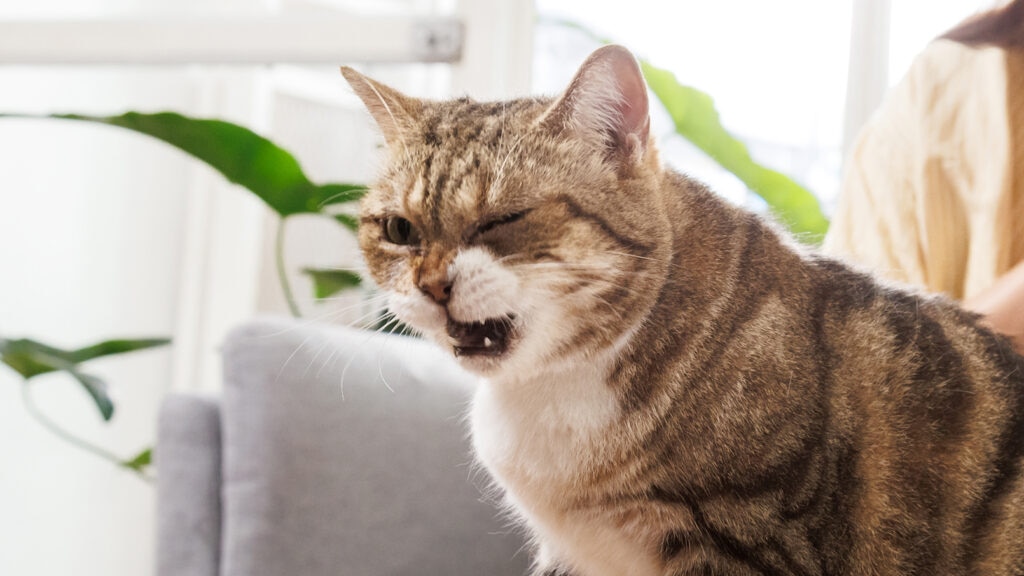Why Is My Cat Coughing? 10 Common Causes and What To Do

Photo by Gumpanat/iStock/Getty Images Plus
You look over and see your cat hunched down, neck stretched, making a strange, raspy hacking sound. Is it a hairball? A sneeze? Something more serious? Chances are, it’s cat coughing—a reflex triggered when something irritates their airway.
Cat coughing can have a range of causes—some minor, others more serious. Learn the common causes of cat coughing and when to call your vet.
Key Takeaways
- Cat coughing is a reflex triggered by irritation in the airways and can range from mild to serious depending on the cause.
- Common causes include asthma, allergies, respiratory infections, inhaled irritants, heartworm, and lungworm.
- Occasional coughing might not be a cause for alarm, but frequent or intense coughing warrants a vet visit.
- Treatment depends on the cause and commonly includes medications and environmental changes.
Can Cats Cough?
“Cats can cough, although it’s not as common as with dogs or humans,” says Bethany Hsia, DVM, co-founder of CodaPet, a nationwide end-of-life pet care service. When they do, it typically sounds like a dry, hacking noise, she adds.
You might see your cat crouch low, stretch their neck, and make a series of forward-thrusting motions. However, unlike gagging or vomiting, which originate from the stomach, cat coughing typically comes from the throat or chest and usually doesn’t bring up anything, such as a hairball or vomit.
Why Is My Cat Coughing? 10 Common Causes
Coughing happens when something irritates the sensitive areas lining your cat’s airways, such as the pharynx, larynx, trachea, or bronchi. These regions contain “cough receptors” that kick in when they detect something that shouldn’t be there. It’s your cat’s natural reflex to clear their respiratory tract.
So, what might be irritating your cat’s system? Here are some of the most common causes of cat coughing.
Asthma
“The most common cause of coughing in cats is feline asthma, an inflammatory condition of the lungs,” says Carly Fox, DVM, a senior emergency room veterinarian at Schwarzman Animal Medical Center, in New York, New York.
Cats with asthma experience inflammation, swelling, and narrowing of the airways, often in response to environmental triggers, such as pollen, mold, or dust. This can lead to chronic coughing, exercise intolerance, wheezing, and sometimes labored breathing, Dr. Fox says.
Allergies
Allergies happen when the immune system overreacts to a usually harmless substance, such as pollen, mold, or dust.
If your cat tends to cough during certain seasons or around specific triggers, an allergy could be to blame.
Allergic reactions can also cause sneezing, wheezing, or watery eyes.
Inhaled Irritants
Some substances can cause irritation without involving the immune system (as with allergies). Strong smells or airborne particles, such as cigarette smoke, cleaning sprays, air fresheners, perfumes, essential oils, or dust, can physically irritate your cat’s airways and trigger coughing.
These reactions may be short-term or ongoing, depending on the level and duration of exposure.
Respiratory Infections
Upper respiratory infections are another common cause of coughing in cats.
These infections are typically caused by viruses, such as feline herpesvirus or calicivirus, although bacterial or fungal infections may also play a role, Dr. Fox explains.
In addition to coughing, infected cats often show other signs, such as sneezing, nasal discharge, congestion, and watery eyes.
Inhaled Foreign Objects
Cats can sometimes inhale small objects, such as blades of grass, dirt, or other debris. When this happens, the material can irritate their airway, triggering a sudden bout of coughing as their body tries to expel it.
In many cases, your cat will cough up the material on their own, but if the coughing doesn’t stop, it could mean it’s still stuck and needs to be removed by a vet.
Trauma
Injuries to the chest or respiratory tract, whether from blunt force such as a fall, burns, or inhalation of harmful chemicals, can cause inflammation and irritation that results in coughing.
If you think your cat has experienced trauma, have them evaluated by a vet right away.
Lungworm
Lungworm is a respiratory infection caused by parasitic worms that invade the lungs and airways.
Cats usually get lungworms by eating infected prey, such as birds, mice, or lizards.
The parasites can irritate and damage lung tissue, often leading to coughing and other breathing problems.
Heartworm
While heartworm is much more common in dogs, cats are not immune. Heartworms are transmitted through mosquito bites and can lodge in a cat’s lungs and heart.
Symptoms may include:
- Coughing
- Asthma-like attacks
- Periodic vomiting
- Lack of appetite
- Weight loss
Unfortunately, cats don’t typically show obvious signs until the disease is advanced, so prevention (usually in the form of a monthly or every-other-month medication) is recommended.
Cancer
Rarely, coughing can be a sign of cancer affecting the lungs, airways, or surrounding structures, Dr. Fox says.
This is more common in older cats and may be accompanied by weight loss, decreased appetite, or lethargy.
Heart Disease
Cats with heart conditions, such as hypertrophic cardiomyopathy (HCM), can develop fluid buildup in or around the lungs, which can lead to coughing or labored breathing in some cases.
Unlike in dogs, heart disease isn’t a common cause of coughing in cats, Dr. Fox says, but it’s still worth considering, especially in older cats.
When Should I Take My Cat to the Vet?
According to Dr. Fox, coughing in cats is never truly “normal”—it’s always a sign that something is irritating the respiratory system.
That said, an occasional cough might just be a response to something minor, like a bit of dust or a mild irritant. But if the coughing becomes more frequent or severe or is accompanied by other symptoms, it’s time to call your vet.
Dr. Fox says to keep an eye out for red flags such as:
- A cough that does not resolve
- A cough that’s associated with any respiratory distress
- Nasal discharge
- Lethargy
- Decreased appetite
- Fever
- Exercise intolerance
- Coughing up blood or mucus
How Is Cat Coughing Treated?
“If your cat is coughing, chest radiographs should be recommended by your veterinarian,” Dr. Fox says. “In addition, I typically recommend blood work and fecal testing, especially if your cat goes outside or has an unknown history.”
Treatment for cat coughing depends on what’s causing it. Common treatments may include:
- Antibiotics for bacterial infections
- Steroids or inhalers for asthma and inflammation
- Dewormers or antiparasitic medications for lungworms or heartworms
- Environmental changes to reduce exposure to irritants, such as smoke or dust
- Cough suppressants (in select cases and only under vet guidance)
- Surgery or advanced care if a tumor or foreign object is involved
Some causes are easily managed, while others might require long-term treatment or ongoing monitoring.
FAQs About Cat Coughing
Can cats get kennel cough?
Yes, cats can catch kennel cough from dogs or other cats, but it’s not common.
Why does my cat keep coughing?
Persistent coughing can be caused by several things, including asthma, allergies, respiratory infections, parasites, or something stuck in the throat. If the coughing doesn’t go away in a day or two or seems to be getting worse, have your cat checked by a vet.
Why is my cat coughing and wheezing?
Coughing paired with wheezing often points to asthma or another condition that affects the airways. If your cat is experiencing these symptoms, check in with a vet, as untreated asthma can become serious over time.
What’s the difference between a wet cough and a dry cough?
A wet cough sounds moist or bubbly, may bring up mucus, and is often linked to infections or fluid in the lungs or airway, Dr. Hsia explains.
A dry cough sounds more like hacking or honking and is often associated with asthma, allergies, or irritation.
What does it mean if a cat coughs up blood?
“Coughing up blood (or hemoptysis) in cats can be a serious symptom and should be considered an emergency,” Dr. Hsia says. “It indicates that there is bleeding somewhere in the respiratory tract: lungs, airways, or even the nasal passages.”
She says possible causes might include pneumonia, lung tumors, parasites, blood clots, a chest injury, or a foreign object stuck in the cat’s airway.



